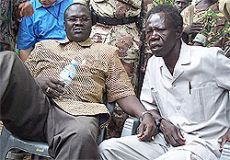South Sudan Machar says LRA deputy is still alive
November 24, 2007 (JUBA) — The government of South Sudan believes that the deputy leader of the Ugandan rebel Lord’s Resistance Army, Vincent Otti, is still alive but being held in house detention, Vice President Riak Machar said.
 “I talked to [LRA leader] Joseph Kony a week ago and asked him about the rumours that Otti may be sick or in jail or dead,” Machar told IRIN in Juba, capital of South Sudan, on 22 November. “In his words, his forces and the forces of his second-in-command had a conflict, but Otti is alive.”
“I talked to [LRA leader] Joseph Kony a week ago and asked him about the rumours that Otti may be sick or in jail or dead,” Machar told IRIN in Juba, capital of South Sudan, on 22 November. “In his words, his forces and the forces of his second-in-command had a conflict, but Otti is alive.”
“I asked him: Is Otti in jail? He said: No, he is not in jail but he is alive. I think Otti is under house detention,” he added.
Rumours about Otti’s whereabouts have persisted for over a month. Analysts believe his death would set back an ongoing peace process aimed at ending more than two decades of insurgency which has displaced more than 2 million people from their homes.
Since talks between the Ugandan government and the LRA started in Juba in July 2006, Otti emerged as a moderate among the rebel ranks. He has been the link between the mediators, northern Ugandan leaders and the rebels.
Along with Kony and three other LRA commanders, including Okot Odhiambo, who has been appointed as the rebels’ new deputy leader, Otti faces indictment from the International Criminal Court (ICC) on charges of war crimes and crimes against humanity. Local leaders in northern Uganda and the rebels have called for the indictments to be dropped, but the ICC insists they must be upheld.
Ugandan media reports and army officials say Otti was arrested in October and killed in early November. On 22 November, the government-owned New Vision newspaper quoted LRA fighters who had surrendered as confirming Otti’s death.
“I have no reason to doubt Kony’s word because he is on board and committed to the peace process,” insisted Machar, who is the talks mediator. “In any case, I am meeting him [Kony] soon – before the 6 December consultative meeting.”
The meeting is expected to bring together hundreds of local leaders from areas that were affected by the insurgency, as well as observers, mediators and other stakeholders to discuss the next steps in the protracted northern Uganda peace process. It is expected to take place in Ri-Kwangba, near the Sudan-DRC border where Kony is camped.
Ahead of the talks, representatives of the rebels have been touring northern Uganda to consult local people and victims of the conflict. They have also met Ugandan leaders including President Yoweri Museveni.
“The consultation that is going on is a major boost to the (peace) process,” Machar explained. “It is a major psychological break through for the LRA and for the Uganda government.”
Humanitarian workers in Juba said the process raised hopes that the conflict could end soon. “I am more optimistic today than I was at the beginning,” David Gressly, UN Deputy Resident and Humanitarian Coordinator for Southern Sudan said.
“The reports from the consultations are very good – a prelude to further talks,” he told IRIN in Juba. “The process is not yet irreversible, but it is moving in the right direction.”
According to Machar, delegates for Ri-Kwangba meeting will be chosen during the consultations. After that meeting, the government and LRA representatives are due to return to Juba to prepare to resume talks.
The northern Uganda conflict started in 1986, when disgruntled Acholi took up arms against Museveni’s government which had just toppled their sons from power. The LRA later assumed leadership of the rebellion and launched a brutal strategy characterised by killings and rape of adults, and abduction of children either to fight in rebel ranks or to offer sexual gratification to the commanders.
According to UN estimates, at least 25,000 children have been abducted by the rebels since the war started. Some of these children are still in rebel captivity, including scores produced by Kony and his commanders from their ‘wives’.
(IRIN)
